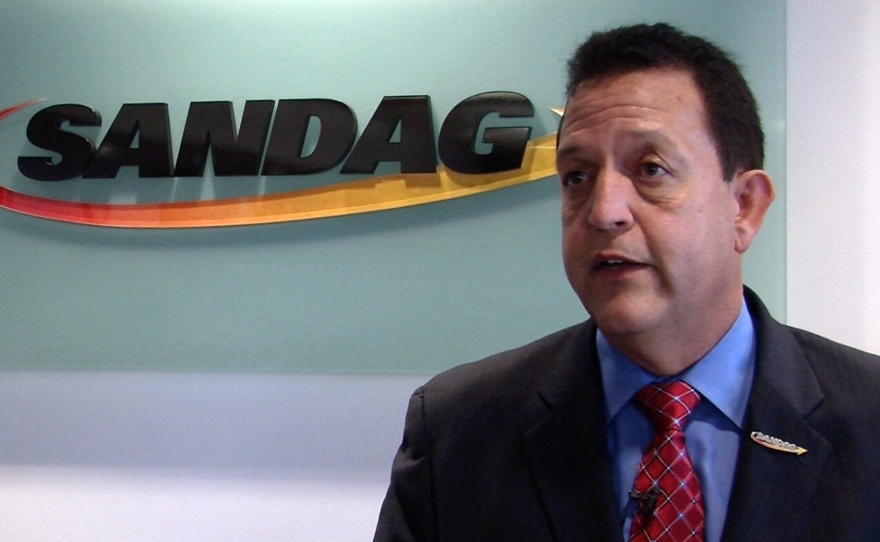An independent investigation into the revenue forecasting scandal surrounding the San Diego Association of Governments found agency staffers pushed the boundaries of California public records law and sought to shield the agency from scrutiny by deleting documents related to the scandal.
The investigators did not conclude definitively that any staffer violated the law, but they did find fault in several decisions made by agency executives, including Executive Director Gary Gallegos, General Counsel John Kirk and Director of Technical Services Kurt Kroninger.
"As a government agency, SANDAG has a responsibility to be honest and straightforward with the public," the report concluded. "By failing to adequately explain how and why it overestimated the Measure A revenue forecast, SANDAG lost employee morale and forfeited the public's trust."
SANDAG posted the report online late Monday evening. It will be formally presented to the SANDAG board of directors Friday by its authors from the Orange County-based law firm Hueston Hennigan.
RELATED: In Patchwork Of Transportation Agencies, What Makes SANDAG Unique?
Measure A, the half-cent sales tax proposed by SANDAG last November, was projected to raise $18 billion over its 40-year lifespan. The money would have funded improvements to San Diego County's roads, freeways and public transit system. It failed to win the necessary two-thirds majority needed to pass.
Investigations by Voice of San Diego found the figure of $18 billion was overly optimistic, based on flawed economic forecasts, and that SANDAG staffers were aware of those flaws well before the election but failed to alert board members or voters.
The roots of the forecasting errors date back to 2004 and were repeatedly copied in updates to SANDAG's economic models, meaning SANDAG economists continued to overestimate how fast San Diego County's economy would grow. Investigators found staff turnover created a lack of expertise in economic forecasting that prevented the errors from being discovered sooner.
The report also accuses SANDAG of "lapses in judgment" in responding to the forecasting errors as they came to light.
Investigators said it was "almost certain" that days after Voice of San Diego published its first articles about the issue on Oct. 24, 2016, SANDAG executives instructed employees to start deleting documents related to the revenue forecasting errors. Interviews with staffers found that the agency was "in a panic" and that some staffers probably deleted documents that they should not have.
California public records law gives special treatment to "preliminary drafts" or internal memos that a public agency does not routinely keep. Agencies can withhold those documents from the public, but only if the public interest in keeping them secret clearly outweighs the public interest in their disclosure.
The investigation found that SANDAG's interpretation of what documents qualified for this exemption was "extraordinarily expansive" and pushed the boundaries of public records law.
"In essence, it included all documents SANDAG employees created in the search for the Measure A error forecasting up until they wrote a final report describing their findings," the report says.
The report's criticism over SANDAG's handling of public records centers on the creation by Kroninger of a special database called "Hana Tools." Staff looking into the Measure A errors were instructed to keep all their investigation-related files on this folder, which was stored on a server disconnected from SANDAG's private, internal network.
This allowed staff to shield their documents from the SANDAG legal team, which is tasked with determining which documents can legally be kept secret and which must be released if someone asks for them. Kroninger admitted to investigators that he created Hana Tools so that "draft" documents could be deleted en masse more quickly, and so they would be out-of-reach from journalists or others filing public records requests.
Witnesses said files were never actually deleted from Hana Tools, but investigators said that claim was impossible to verify.

It is unclear what, if any, consequences SANDAG staffers and executives may face because of the report's findings. Calls by SANDAG critics for the resignation of Gallegos, the executive director, have been largely dismissed or ignored by board members.
Regardless of how the report is received by board members Friday, it is likely to embolden efforts in Sacramento to reform the agency's governing structure. AB 805, authored by Assemblywoman Lorena Gonzalez Fletcher (D-San Diego), would create an internal performance auditor at the agency to increase oversight and accountability. It would also give labor unions more favorable treatment in construction projects and shift some decision-making power from small towns to big cities.
Last Friday, SANDAG board members voted to start crafting their own reform measures that could be put up for a vote in the county. Critics have dismissed that vote as a cynical attempt to undermine more meaningful reform.
"But really, they can reform themselves," the assemblywoman said sarcastically on Twitter. "Out of my mind. Time for a state investigation."
Gonzalez Fletcher later said in a statement that she would refer the investigation to the California Attorney General's Office and that she would request a state audit of SANDAG's "misreporting of finances."






